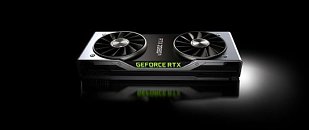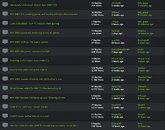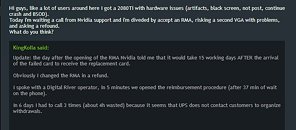Wednesday, October 31st 2018

NVIDIA Confirms Issues Cropping Up With Turing-based Cards, "It's Not a Broad Issue"
It has been been making the rounds now on various forum sites (including our own TPU) that problems have been cropping up for users of NVIDIA's Turing-based architecture graphics cards. The reports, which are increasing in number as awareness of the issue increases, vary in their manifestation, but have the same result: "crashes, black screens, blue screen of death issues, artifacts and cards that fail to work entirely," as reported by the original Digital Trends piece.
Of course, at the time, problems with the source for the information were too great to properly discern whether or not this issue stood beyond the usual launch issues and failures that can (and will happen) to any kind of hardware. The fact that people with negative experiences would always be more vocal than those without any problem; the fact that some accounts on the reported forums were of doubtful intent; and that the same user could be posting across multiple forums would always put a stop to any serious measurement of the issue. Now, though, NVIDIA has come out with a statement regarding the issue, which at least recognizes its existence.Problems have been cropping up with both NVIDIA-made and AIB cards from various manufacturers, which seemingly rejects the possibility for manufacturer-based issues, and leaves on the table either an architectural or manufacturing batch issue (no confirmations yet). Let's hope this really is confined to a batch issue, though there have been multiple reports of users that got their cards RMA'd and then got one or two replacements that met ther same fate). The issue seems to be affecting owners of the flagship RTX 2080 Ti the most, though there are reports of 2080 models being affected as well.In response, NVIDIA acknowledges the issue, but limits its relevance: as reported by Tom's Hardware, the company said that "it's not an increasing number of users" affected by this problem, saying "it's not broad." It then added that "we are working with each user individually like we do always." We're here to wait and see, but this definitely doesn't do any favors in grabbing more sales for the RTX 20-series, when the flagship graphics card costing over $1,000 fails on users.
Sources:
GeeksULTD, via Tom's Hardware, GeForce Forums, GeForce Forums, Forbes, TechPowerupForums
Of course, at the time, problems with the source for the information were too great to properly discern whether or not this issue stood beyond the usual launch issues and failures that can (and will happen) to any kind of hardware. The fact that people with negative experiences would always be more vocal than those without any problem; the fact that some accounts on the reported forums were of doubtful intent; and that the same user could be posting across multiple forums would always put a stop to any serious measurement of the issue. Now, though, NVIDIA has come out with a statement regarding the issue, which at least recognizes its existence.Problems have been cropping up with both NVIDIA-made and AIB cards from various manufacturers, which seemingly rejects the possibility for manufacturer-based issues, and leaves on the table either an architectural or manufacturing batch issue (no confirmations yet). Let's hope this really is confined to a batch issue, though there have been multiple reports of users that got their cards RMA'd and then got one or two replacements that met ther same fate). The issue seems to be affecting owners of the flagship RTX 2080 Ti the most, though there are reports of 2080 models being affected as well.In response, NVIDIA acknowledges the issue, but limits its relevance: as reported by Tom's Hardware, the company said that "it's not an increasing number of users" affected by this problem, saying "it's not broad." It then added that "we are working with each user individually like we do always." We're here to wait and see, but this definitely doesn't do any favors in grabbing more sales for the RTX 20-series, when the flagship graphics card costing over $1,000 fails on users.




127 Comments on NVIDIA Confirms Issues Cropping Up With Turing-based Cards, "It's Not a Broad Issue"
Every problem is always a small one until it's not
'Its not a big issue, we forgot some insignificant detail, move on pls'
We all know what came next. That said, this is not the same kind of problem of course, but it underlines why you can use a bag of salt when reading this article.
A) perspective - 50 rtx 2080 ti's are dud - "who cares, replace, refund and move on, haters gonna hate";
B) perspective - 50 rtx 2080 ti's from 500 total are dud - "Houston we have a problem";
but two things are for sure:
1) there IS a problem!
2) any problem will be downplayed by official corporate response - as the smallest nothing there could be. It is like a knee jerk reaction for any problem from any company EVER - why even bother to read corporate responses at in this day and age (aka the corporate gibberish, "deny-everything", "fake news anything you not like", "lie even when you being caught" age).
it’s just when you use the last 0.5GB that the Whole memory amount is being slowed Down to a really low bandwidth. COME on people this isn’t news get the facts right.
But no matter the price of the product errors happens, so as long as the users don’t have to wait or go through a loooooooong process to get refund/replaced then I don’t see the problem
AND…. Don’t buy your stuff online if you want 1 day replacement service :)
But seriously... in the other massive thread about this, it all comes down to perspective. How many is this? Is it really a big issue? NVIDIA says not (of course), but who really knows how big of an issue this really is. Until we know, its prudent that judgement should be withheld.
There are people here and elsewhere convinced there is a coverup (I don’t, but I recognize that many do). Had that not happened, Nvidia might currently have more credibility in their denial.
I’ve always said there is 4 GB of VRAM on the 970.
Granted, coming clean when the "issue" was discovered would have helped. But come on. No knowledge truly changed how, at the end of the day, the card performed for the price asked of it.
people buy a box with a product in it. The box says it has specs so-and-so. The product in the box did not meet those specifications. When the product is pushed to a supported configuration called SLI, performance becomes inconsistent. Fast forward to 2018: most games require over 4GB for decent IQ settings and the 970's core can easily push that, but VRAM is now holding it back. Ever since its release, the 970 has fallen down the performance charts more rapidly than other 4GB cards. Its small, but the trend is there and you could already see single digit performance losses beyond what you'd expect shortly after it launched. When we get 2% from drivers we all download them, but when we lose 3-4% because of being misled, we don't care?? Rather odd IMO.
"The card did have 4GB on it". Do you say the same when they market a GDDR5 card and you find DDR3 on it? Because essentially, the effect of the way the die was cut, meant that one memory chip had access to bandwidth that was about as slow as system RAM. These memory setups are not new to Nvidia. They've done it with Fermi, they've done it with Kepler. But never was it such a crappy job as this one, for example, the GTX 660 had 128-bit width for 1.5GB of its memory and a 64-bit width for the remaining 0.5GB. Sound familiar? Put those in SLI and you have a stutterfest even when you underclock the core.
It was long overdue they took the fall for this. The fact you didn't see the problem doesn't mean its not there. And lo and behold: Pascal has nice, evenly cut up GPUs that handle memory b/w in a different way. But we still get 1060's with, now, over five different VRAM setups...
Regardless, my mentioning of it was a reference to how trustworthy these Nvidia statements are and how the real world works just a tad different from that.